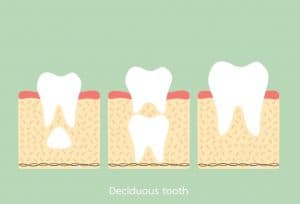Baby teeth:
The official name for baby teeth is deciduous teeth. There are 20 deciduous teeth in total. They start to appear in the mouth at around 6mths of age and may last until the teenage years. Click here for an eruption chart. Similar to adult teeth, they serve an important purpose in chewing, speaking, smiling and biting. Baby teeth are smaller and whiter than, adult teeth.
Can baby teeth get cavities?
YES!!! Absolutely, just like adult teeth, baby teeth can decay due to lack of brushing and consumption of sugary foods and drinks. Cavities can form on the outside or the inside of baby teeth.
Do baby teeth cavities hurt?
YES! Absolutely, just like adult teeth, if baby teeth cavities are deep enough, they will cause pain. If the cavities extend all the way to the centre of the tooth – where the nerve lies, then pain may also come with infection and gum or face swelling.
Don’t they just fall out on their own?
Baby teeth usually get loose and fall out when its time for the adult tooth to come out. They DO NOT automatically just fall out when they get rotten. In fact, a baby tooth may get a cavity and still be years away from when it is due to naturally exfoliate. This presents a dilemma for both the dentist and the parent – to restore or to remove…??

Benefits of restoring baby teeth with cavities:
- tooth is saved and remains in mouth until it is due to naturally fall out
- prevent a possibly traumatic experience of having a dental extraction for the child
- no visible gaps
- child able to bite, chew and speak properly
- if cavity shallow – procedure may not require the use of a dental anaesthetic (needle)
Downsides of restoring baby teeth with cavities:
- if cavity deep – procedure may require the use of a dental anaesthetic (needle)
- multiple appointments may be required
- tooth may flare up in the future and need further treatment
- quality of the restoration depends on how still the child can remain during appointment
- can be financially challenging
- may require a visit to a kid’s dental specialist
Benefits of pulling out baby teeth with cavities:
- single appointment – usually pretty quick
- no risk of tooth causing problem again – more definitive solution
- less expensive
Downsides of pulling out baby teeth with cavities:
- may be a traumatic experience for the child
- unnatural gap is created in the mouth
- surrounding teeth may move in, to close the gap
- may not be enough room for the adult tooth – when it comes out
- harder to eat (if at the back)
- harder to speak (if at the front)
What’s the best option?
There is definitely no one-fits-all answer, in relation to what the best treatment option is. The important factors to consider are:
- How comfortable is your child with the idea of keeping VS pulling out their tooth?
- How long until the adult tooth is due to come out?
- What length appointment can your child tolerate?
- Financial considerations
- What to the other teeth look like and will they require treatment too?
It’s a very good idea to get a professional opinion from a dentist and consider all factors, before committing to either keeping or pulling out a baby tooth. If you feel that your child may require dental treatment, please come in for a consultation and at least know what the options are.
The best time to either restore a tooth with a cavity or remove it, is BEFORE it becomes painful. Don’t leave it until it’s too late.

